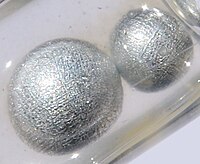
Photo from wikipedia
Background: Low potassium increases the phosphorylation and activity of the sodium chloride cotransporter (NCC) in the distal convoluted tubule of the nephron, which contributes to the hypertensive effect of the… Click to show full abstract
Background: Low potassium increases the phosphorylation and activity of the sodium chloride cotransporter (NCC) in the distal convoluted tubule of the nephron, which contributes to the hypertensive effect of the modern low potassium/high sodium diet. A central mediator of potassium regulation of NCC is the chloride-sensitive With No Lysine [K] (WNK) kinase. Summary: Chloride directly inhibits WNKs by binding to the active site. The mechanisms underlying WNK regulation by extracellular potassium are reviewed, as well as the modulatory effect of kidney-specific-WNK1. WNK1, but not WNK1 kinase activity, is also required for the aldosterone-independent regulation of the epithelial sodium channel by potassium. Whether intracellular chloride could be involved in this process is discussed. Recent studies demonstrating direct regulation of WNKs by intracellular potassium are also reviewed, and the potential physiological relevance to renal epithelial ion transport is discussed. Key Messages: WNKs are sensors of the intracellular ionic milieu. In the nephron, changes in extracellular ion concentrations, resulting in changes in intracellular ion concentration, regulate WNK activity and downstream transporters and channels to maintain total body ion homeostasis.
Journal Title: Nephron
Year Published: 2022
Link to full text (if available)
Share on Social Media: Sign Up to like & get
recommendations!